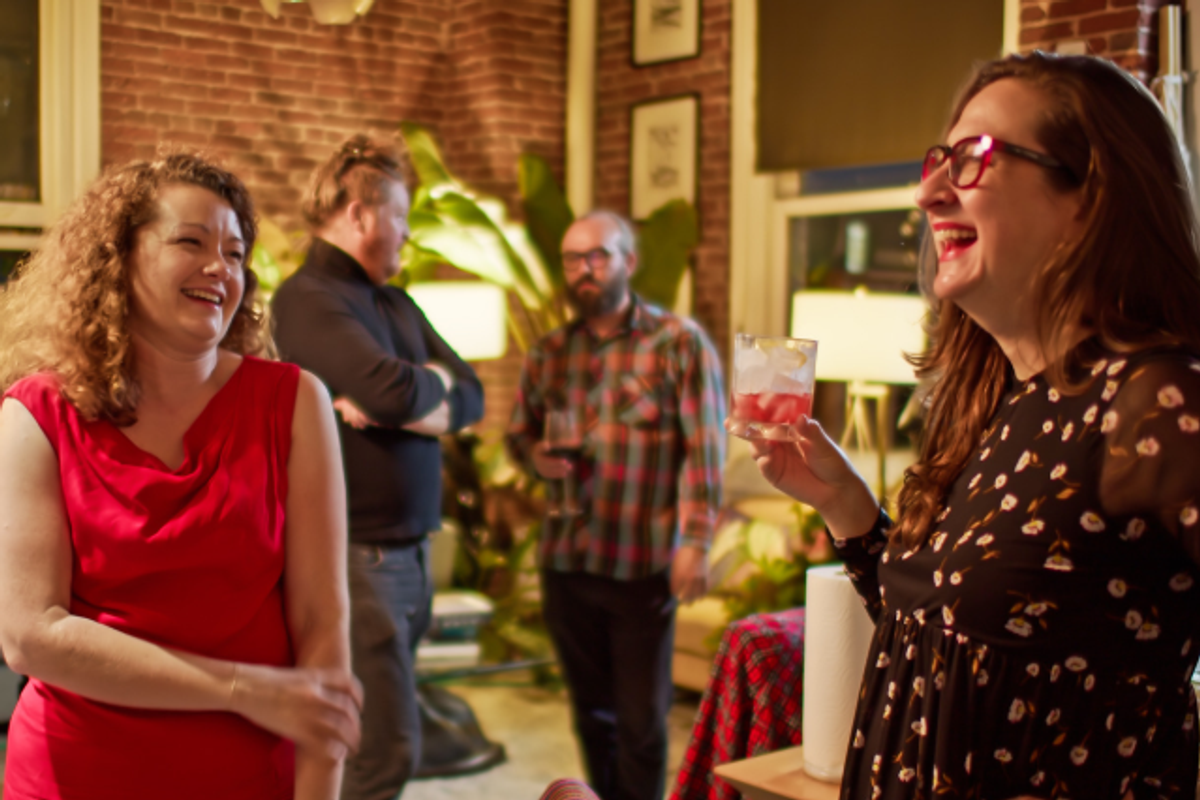57-year-old former model Paulina Porizkova had the perfect response to ageist comment online
"We have earned our beauty, we understand what it is, and we can see it so much better."

Paulina Porizkova took on a commenter who said she was in "pain" being "old and ugly."
Aging is a weird thing. From one perspective, it's something we should be grateful for. Few people would wish for the kind of short, uneventful life that would remove aging from the equation completely. The longer we live, the more we grow and learn and experience life, and "aging" is simply the mathematical sum of those experiences. All good, right?
On the other hand, American society does everything in its power to stop and even reverse aging. Especially when it comes to women. According to Statista, the global anti-aging beauty market is estimated to be worth $58.8 billion. People will try all manner of creams, serums, masks, acids, lights, technologies, and surgeries to try to prevent wrinkles, lines, sagginess, spots and other signs that our bodies are changing with time.
Most of us live our daily lives somewhere in the middle of these two realities, wanting to embrace our aging selves but also hoping to stave off some of the more obvious signs that we're getting older. It's natural to resist it in some ways. The older we get, the closer we're moving to the end of our lives, which we don't want to hasten for plenty of reasons: love for family, friends, relationships, adventures, food, etc. Plus, that reality can cause us some anxiety.
While Fear of Getting Old (FOGO) is real, it can be helpful to see people gracefully embracing their age. Case in point: former supermodel Paulina Porizkova who confidently shared photos of her 57-year-old self on social media 2022.
Porizkova shared a photo of herself in a bikini and a screenshot of a comment made by a person who felt the need to critique her aging body. And phew, was it something. The commenter wrote:
"You must be in so much pain to keep posting bikini pictures at your age. I've always thought that getting old and ugly is hardest on the pretty people. The fall from grace is so much farther when you were beautiful. Ugly people were always ugly so getting old and ugly isn't a change. In summary, I feel your pain. I pray you can come to terms with your mortality. We all get old and ugly…you just had to fall from a greater height than the rest of us. Tears Times Infinity!"
So many things to unpack here. First of all, the comment is weird. Second of all, it's rude. Third of all, it's clearly ageist, which, according to the American Psychological Association (APA) is "one of the last socially acceptable prejudices." Yikes.
Porizkova shared her thoughts on the comment on Instagram.
"Here’s a good follower comment- echoing a few others," Porizkova wrote. "A woman of 57 is 'too old' to pose in a bikini - no matter what she looks like. Because 'Old' is 'Ugly.' I get comments like these every time I post a photo of my body. This is the ageist shaming that sets my teeth on edge. Older men are distinguished, older women are ugly."
"People who believe prettiness equals beauty do not understand beauty," she continued. "Pretty is easy on the eyes, partly because it’s a little bland, inoffensive. It’s easy to take in and easy to forget. Not so beauty. Beauty can be sharp. It can wound you and leave a scar. To perceive beauty you have to be able to SEE."
"This is why I believe we get more beautiful with age," she added. "We have earned our beauty, we understand what it is, and we can see it so much better. There is no such thing as ugly and old. Only shortsighted and ignorant."
On X (formerly Twitter), Porizkova was a bit more sarcastic, writing, "Thank you for feeling my pain, rickaroo777. As you can see, I’m suffering indeed."
That tongue-in-cheek response prompted others to share their aging selves in photos, sharing how their "old and ugly" phase of life is going. The thread turned into a veritable celebration of middle-to-late age, with posts about how much more comfortable people feel in their bodies as they get older and the freedom that comes along with not caring what other people think.
You suffer beautifully
There are two big ironies with the original trolling comment. Most obviously, Porizkova obviously looks freaking amazing in a bikini, so the whole "ugly" and "fall from grace" line of thought is objectively off base. The second is that if you look through Porizkova's Instagram feed, she doesn't pose in bikinis very often at all. It's not like she's plastering her bikini selfies all over social media trying to feel better about herself, as the commenter implies. She just…sometimes wears a bikini. Whoop dee doo.
People don't have to wear bikinis if they don't want to. But to tell strangers what they can wear crosses a line. All bodies are bikini bodies, and if the person in the body wants their body to be in a bikini, more power to them.
The "suffering" and "pain" in the posts were so funny to see.
The thread brought inspiration to those who may fall prey to the idea that people shouldn't wear certain things after a certain age or that only people with certain body sizes or shapes should wear certain things.
The hashtag #oldandugly started trending as people responded to Porizkova's call for a celebration of aging beautifully.
"Todays thread has been my absolute favorite of all time," Porizkova wrote on Twitter. "Thank you all you 'old and ugly' women (and a few men) showing the world how much we 'suffer' at in our old age. You’re all breathtaking!"
May we all age beautifully and gracefully in whatever way those words are meaningful to us, and show those who think that aging means "suffering" and "pain" due to being "old and ugly" that they have no idea what they're talking about.
(And here's an extra shout-out to Porizkova for using her beauty and her age to make an important point—not only about celebrating getting older, but also about how propaganda works. Brava.)
- Justine Bateman boldly embraces her aging face, putting a new spin ... ›
- Kate Winslet shares commentary on women in their 40s - Upworthy ›
- People defend aging naturally after Emilia Clarke gets trolled - Upworthy ›
- Study shows people age dramatically around age 44 and age 60 - Upworthy ›
- Gen X and Boomers share the most unexpected signs of aging - Upworthy ›
- People over 50 share how they have aged gracefully - Upworthy ›




 Curtains can help make a space feel homey and hide bad windows and trim.
Curtains can help make a space feel homey and hide bad windows and trim. Clean and tidy sets a mood.
Clean and tidy sets a mood. Lighting makes a big difference in how your home feels.
Lighting makes a big difference in how your home feels.
 A man being licked by a golden retreiver.
A man being licked by a golden retreiver.  A dog's tongue close-up.
A dog's tongue close-up.  A golden retreiver getting their teeth brushed.
A golden retreiver getting their teeth brushed. 
 Cathedral-like libraries like the George Peabody Library in Baltimore, Maryland are popular places for creative work.By Matthew Petroff/
Cathedral-like libraries like the George Peabody Library in Baltimore, Maryland are popular places for creative work.By Matthew Petroff/ The Sterling Memorial Library at YaleBy Nick Allen/
The Sterling Memorial Library at YaleBy Nick Allen/
 A woman making eye contact with a man she is speaking to.via
A woman making eye contact with a man she is speaking to.via  A man in a suit with questions.via
A man in a suit with questions.via